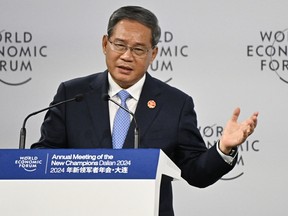
Chinese Premier Warns Decoupling Will Cause “Destructive Spiral”
Chinese Premier Li Qiang Warns Decoupling Will Cause "Destructive Spiral"
In a recent address at the World Economic Forum’s meeting in Dalian, Chinese Premier Li Qiang cautioned against the negative consequences of economic decoupling between nations. He emphasized that such actions would lead to a "destructive spiral" where countries engage in fierce competition for a larger share of resources, ultimately resulting in a diminishing pie.
The Risks of Decoupling
Li’s remarks come amidst growing tensions between China and several Western countries, including the United States and Canada, over trade policies. The Chinese premier warned that decoupling would not only harm individual nations but also have far-reaching consequences for the global economy.
"The regressive actions of decoupling would only drag the world into a destructive spiral where the fierce competition for a larger slice ends up in a diminishing pie," Li said. "This is something we do not want to see."
China’s Industrial Policy
Li also addressed criticism that China’s industrial policy has led to overcapacity and dumping cheap goods on the global market. He emphasized that China’s focus on science and technology has created a favorable environment for enterprises to innovate and upgrade their products.
"Exploration should not be seen as (a) zero-sum game," Li added, highlighting the importance of cooperation and mutual benefit in economic development.
Trade Tensions
The Chinese premier’s comments come after Canada announced plans to clamp down on imports of Chinese-made electric vehicles. The move aligns with the Biden administration’s trade policies, which have also targeted EVs from China.
Meanwhile, the European Union has proposed increasing tariffs on EVs, sparking concerns about potential retaliation from China. In a bid to ease tensions, China has suggested offering concessions to Germany, including lower tariffs on large-engine cars, if the EU scraps its planned EV levies.
China’s Economic Outlook
Despite ongoing challenges in the property market and weak consumer confidence, Li expressed optimism about China’s economic prospects. He reiterated the government’s goal of achieving around 5% GDP growth this year and announced a combination of measures to boost the economy, including fiscal policy and financial support.
"We are confident and capable in achieving the growth target of about five per cent for this year," Li said, referring to his government work report in March. "We will adopt a combination of measures, including fiscal policy and financial means, to boost our economy."
Global Economic Forum
The World Economic Forum meeting in Dalian has brought together global business executives and world leaders, including Polish President Andrzej Duda and Vietnamese Prime Minister Pham Minh Chinh. The event precedes the major Communist Party plenum in July, which could unveil a series of reforms to revitalize the sluggish economy.
Xi Jinping’s call for China to step up innovation in key technologies, such as semiconductors, underscores the country’s focus on developing its technological capabilities to drive future growth.
Conclusion
Premier Li Qiang’s warning about decoupling highlights the need for international cooperation and mutual benefit in economic development. As global trade tensions continue to escalate, it is essential for countries to prioritize dialogue and collaboration to avoid the "destructive spiral" predicted by the Chinese premier.


